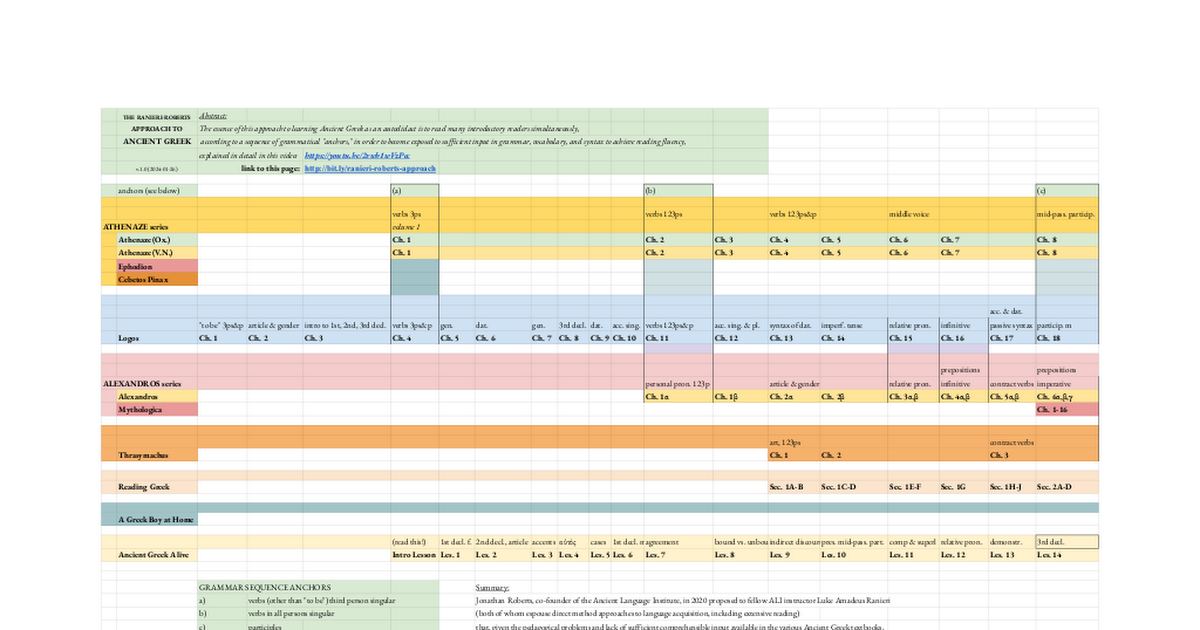AFODO
Well-known member
- Joined
- Oct 2, 2022
- Messages
- 3,349
Greetings everyone, this is an invitations for all of you who are interested in learning the ancient Greek language, and to those who already know it to some level.
I will make a group conversation on the forums and invite people who are interested, if we reach a limit we will see what we can do.
About the language in short, this is a language in history of high importance, both because of it's spiritual properties and overall the divinity of the language, and because of the literature that this language has. There are countless philosophers, mathematicians, poets, and so on who were spiritually advanced, very advanced, and used this language to share their ideas, knowledge and so on. Knowing this language to an extent to understand these texts, written by people such as Aristotle, Pythagoras, Plato, Homer, just to name the famous ones, will give you a more in depth sight of our path, about the Gods and our lives.
Ancient Greek is not much behind Sanskrit in terms of spiritual power or it's not behind it at all, (but obviously HPHC is needed to be ask for more accurate answer regarding this).
As learning a second or third or as many language you want, this will greatly enhance many of your intellectual abilities, and this is more pronounced with such a divine language. This is a great hobby to have.
If anyone on the planet are suited to speak this language than it's us, Satanists.
The resources we'll use are based on the "natural method", the "extensive reading method", the "comprehensible input method". Mainly.
This is mostly about learning the target language in the target language, to not translate sentences, but to comprehend sentences in the target language, while new words are presented with drawings, pictographs, or they are simply comprehensible by the context. You will obviously not learn the whole language like this, and an extremely perfect resource would be needed for this otherwise. You will obviously need to look up dictionaries, and not all the books in our resources will be based on this method.
When it comes to resources to learn ancient Greek, most assumes you know Latin, and most are not good. Still we will use 12 books that are great in their own thing, and when combined, they give you a pretty good autodidact experience. 12 books to be exact, this is why it's an extensive reading method.
Below you see the spreadsheet where these books are beautifully organized, where each column is a new grammatical concept. So going column by column, you will read different books introducing you to the same grammatical concepts. So here is the spreadsheet(made by Luke Ranieri, polymathy on youtube):

 docs.google.com
docs.google.com
You can download the books very legally from here:
 ancient-forums.com
(you can also watch the videos mentioned here and memorize the alphabet.)
ancient-forums.com
(you can also watch the videos mentioned here and memorize the alphabet.)
Or you can buy them on amazon. Or at least some of them.
So, the aim of this learning group of ours, is to finish one column per week. The first 3 columns are to be read in the first week, AKA. the first 3 chapter of the Logos book, than it's just one column per week. This will be very easy in the beginning, but the language gets harder and too much new vocabulary will be presented. This is not an easy challenge but that's why I'm making this group, to help and encourage each-other.
10-20 minutes a day should be enough to complete this challenge, but it depends on you how much time you put into this. I haven't checked how much page there is to be read in later chapters but I imagine you would not need to spend much more than 20 minutes per day to read them in one week.
Furthermore, flashcards, or similar ways of acquiring vocabulary is good. Such can be practiced outside of these resources which is the baseline.
In our group we will discuss what we learnt, what we know, what we didn't understood and what we don't know. Even in ancient Greek if we can. Although using the language is not the biggest importance in acquiring it, especially as a beginner. However this can crystallize our knowledge and using it in groups, we can correct each other which will be much better than talking to yourself and making grammatical errors that you'll never know you made. These errors can than grow in you and in best case scenario, you will only realize this later. But not with our group.
I sincerely ask everyone to ask everything you don't understand, as this is why this group is.
So this is than why I ask people who already know some level of ancient Greek to join us, and act as a teacher here while you can also further you level of competence.
Before you start to read, there is a basic knowledge you have to have about ancient Greek.
The below resources beautifully sums this up, please read / watch them if you consider joining.
https://en.wikipedia.org/wiki/Ancient_Greek_grammar - This is to briefly know what grammatical concepts are there in ancient Greek. To know what you'll learn about.
- this is the pronunciation (you can just watch the attic part.)
http://atticgreek.org/pronunc/alphaU.html -This is also pronunciation. But this also shows the attic ancient Greek letters on the right (or below) in small, those are the letters that were used before 400bc. click on those letters for the attic pronunciation.
For more, you can check this channels out:

 www.youtube.com
www.youtube.com
There is not much people who uploads videos on ancient Greek. He also has a "ancient Greek in action" course, that you can follow (it's goodly aligned with the logos book). Just be aware that he doesn't use the attic pronunciation, but a later one.
There are some interesting and good videos on ancient Greek from others too:
You study about the language in general until we start.
If you are interested, comment here or mail me on the forums or whatever. We will start on Sunday October 13, 2024, this is optimally when you should start reading the books, and I'll make the group on this day (beware of the VoC).
I will make a group conversation on the forums and invite people who are interested, if we reach a limit we will see what we can do.
About the language in short, this is a language in history of high importance, both because of it's spiritual properties and overall the divinity of the language, and because of the literature that this language has. There are countless philosophers, mathematicians, poets, and so on who were spiritually advanced, very advanced, and used this language to share their ideas, knowledge and so on. Knowing this language to an extent to understand these texts, written by people such as Aristotle, Pythagoras, Plato, Homer, just to name the famous ones, will give you a more in depth sight of our path, about the Gods and our lives.
Ancient Greek is not much behind Sanskrit in terms of spiritual power or it's not behind it at all, (but obviously HPHC is needed to be ask for more accurate answer regarding this).
As learning a second or third or as many language you want, this will greatly enhance many of your intellectual abilities, and this is more pronounced with such a divine language. This is a great hobby to have.
If anyone on the planet are suited to speak this language than it's us, Satanists.
The resources we'll use are based on the "natural method", the "extensive reading method", the "comprehensible input method". Mainly.
This is mostly about learning the target language in the target language, to not translate sentences, but to comprehend sentences in the target language, while new words are presented with drawings, pictographs, or they are simply comprehensible by the context. You will obviously not learn the whole language like this, and an extremely perfect resource would be needed for this otherwise. You will obviously need to look up dictionaries, and not all the books in our resources will be based on this method.
When it comes to resources to learn ancient Greek, most assumes you know Latin, and most are not good. Still we will use 12 books that are great in their own thing, and when combined, they give you a pretty good autodidact experience. 12 books to be exact, this is why it's an extensive reading method.
Below you see the spreadsheet where these books are beautifully organized, where each column is a new grammatical concept. So going column by column, you will read different books introducing you to the same grammatical concepts. So here is the spreadsheet(made by Luke Ranieri, polymathy on youtube):
The Ranieri-Roberts Approach to Ancient Greek
You can download the books very legally from here:
Ancient Greek, a Language of the Gods
Why study Ancient Greek? This is my attempt to inspire interest in learning this Holy and Divine language which holds a close resemblance to those of the Gods. [8] Ancient Greek had a wide range of influence in the Ancient World, expanding far past Greece to places such as Egypt...
Or you can buy them on amazon. Or at least some of them.
So, the aim of this learning group of ours, is to finish one column per week. The first 3 columns are to be read in the first week, AKA. the first 3 chapter of the Logos book, than it's just one column per week. This will be very easy in the beginning, but the language gets harder and too much new vocabulary will be presented. This is not an easy challenge but that's why I'm making this group, to help and encourage each-other.
10-20 minutes a day should be enough to complete this challenge, but it depends on you how much time you put into this. I haven't checked how much page there is to be read in later chapters but I imagine you would not need to spend much more than 20 minutes per day to read them in one week.
Furthermore, flashcards, or similar ways of acquiring vocabulary is good. Such can be practiced outside of these resources which is the baseline.
In our group we will discuss what we learnt, what we know, what we didn't understood and what we don't know. Even in ancient Greek if we can. Although using the language is not the biggest importance in acquiring it, especially as a beginner. However this can crystallize our knowledge and using it in groups, we can correct each other which will be much better than talking to yourself and making grammatical errors that you'll never know you made. These errors can than grow in you and in best case scenario, you will only realize this later. But not with our group.
I sincerely ask everyone to ask everything you don't understand, as this is why this group is.
So this is than why I ask people who already know some level of ancient Greek to join us, and act as a teacher here while you can also further you level of competence.
Before you start to read, there is a basic knowledge you have to have about ancient Greek.
The below resources beautifully sums this up, please read / watch them if you consider joining.
https://en.wikipedia.org/wiki/Ancient_Greek_grammar - This is to briefly know what grammatical concepts are there in ancient Greek. To know what you'll learn about.
http://atticgreek.org/pronunc/alphaU.html -This is also pronunciation. But this also shows the attic ancient Greek letters on the right (or below) in small, those are the letters that were used before 400bc. click on those letters for the attic pronunciation.
For more, you can check this channels out:
polýMATHY
Polymathy is the study of many things. On my videos I want to share with you what I find interesting about science, technology, languages, geopolitics, and history. Thanks for subscribing and sharing my videos.
There is not much people who uploads videos on ancient Greek. He also has a "ancient Greek in action" course, that you can follow (it's goodly aligned with the logos book). Just be aware that he doesn't use the attic pronunciation, but a later one.
There are some interesting and good videos on ancient Greek from others too:
You study about the language in general until we start.
If you are interested, comment here or mail me on the forums or whatever. We will start on Sunday October 13, 2024, this is optimally when you should start reading the books, and I'll make the group on this day (beware of the VoC).


